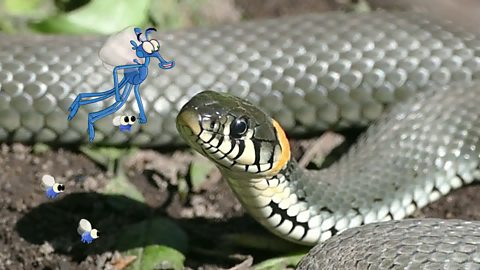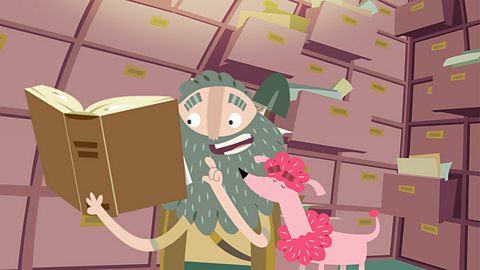How does our skeleton work?
Video - How the human skeleton works
In this video, learn about the human skeleton and how it lets us move, hold our bodies up and protect our organs.
How bones and the human skeleton let us move, hold our bodies up and protect our organs.
Settle down please kids.
We’ve come to this yoga class to talk about the human skeleton.
We flies have hard coverings on the outside of our bodies called exoskeletons.
But with humans, it’s all going on under the skin.
The human skeleton is made up of more than 200 bones that give protection and support and allow the body to move.
The skeleton gives the body its shape and helps hold it up.
Without it, humans would just be big blobs that wouldn’t be able to stand up, never mind do yoga!
Bones like the ribs and spine help keep the body upright, and bones like the ones you find in the arms and legs help it move.
But bones don’t move on their own.
They’re attached to muscles that pull them into different positions.
Bones are also there to protect squishy vital organs.
For example, the hard skull protects the soft brain, and the ribcage protects the heart and lungs.
But bones do sometimes get broken.
Fortunately, they’re living things that can repair themselves.
New cells grow where the break is, and fuse the two parts of the bone together again.
When humans get older, their bones can lose their strength, so eating foods containing calcium, like milk or spinach, and exercising regularly helps bones stay stronger for longer.
I do a bit yoga myself, you know.
This what I like to call the double flying lotus.
Oh dear.
A little help please?
What is a skeleton?
The skeleton is the structure that gives a body its shape.
Mammals (including humans), birds, fish, reptiles and amphibians all have skeletons made from bones.
What do bones do?
Some of our bones hold us upright.
Others protect our organs:
- the skull protects the brain
- the ribs protect the heart and lungs
Other bones help us move.
How do bones move?
Bones can't move on their own. They are moved by muscles.
When a muscle tightens it pulls the bones attached to it into a new position.
How many bones are in the human skeleton?
Did you know children have more bones than adults?
When you are born you have around 270 bones. As you get older some of these join together so they don't count as separate bones.
Adults have around 206 bones.
Quiz
More on Body systems
Find out more by working through a topic
- count11 of 25

- count13 of 25
